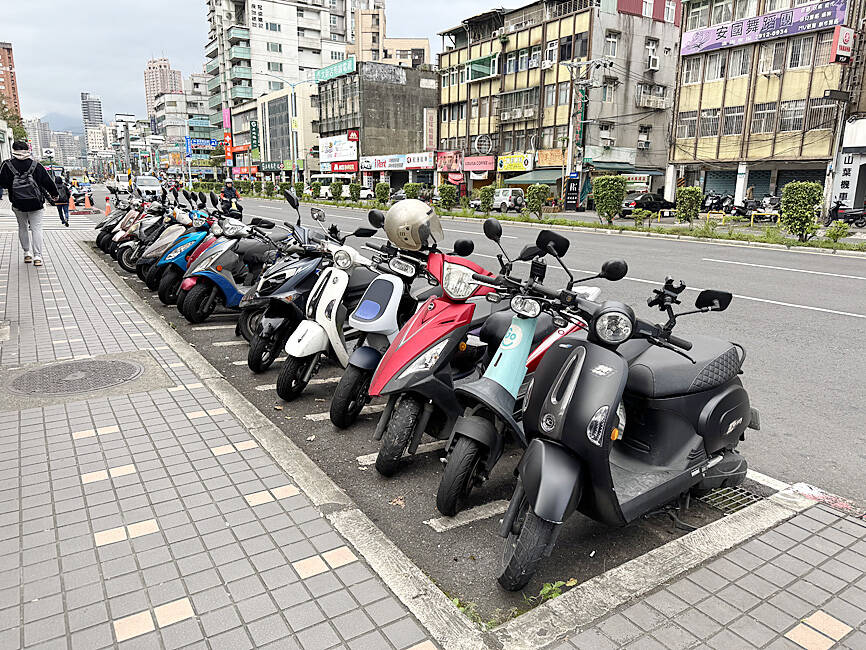The Legislative Yuan yesterday passed the third reading of amendments to the Commodity Tax Act (貨物稅條例) that extend tax incentives to encourage people to replace their old vehicles and purchase new ones.
The amendment to Article 12-5 of the act extends the NT$50,000 tax deduction on replacing old vehicles, including sedans, mini trucks and light passenger-cargo dual-purpose cars — such as pickups — to purchase new ones from Jan. 1 next year to Dec. 31, 2030.
A NT$4,000 tax deduction for replacing old motorcycles with new ones has also been extended to 2030.

Photo: Tsai Yun-jung, Taipei Times
The amendments also offer a NT$50,000 deduction on purchases of new passenger sedans that have an engine displacement of 2,000cc or less, and NT$2,000 on purchases of new 150cc motorcycles.
That means a vehicle owner who scraps his vehicle and buys a new 2,000cc or smaller passenger sedan would enjoy the existing NT$50,000 tax deduction on top of the NT$50,000 deduction approved in the new amendment.
During a legislative committee review of the proposed amendment on Thursday last week, Deputy Minister of Economic Affairs Ho Chin-tsang (何晉滄) told lawmakers the expanded tax deduction is expected to help first-time buyers, with local automakers looking forward to swift passage of the bill.
Minister of Finance Chuang Tsui-yun (莊翠雲) told lawmakers that the bill meets public expectations and would encourage purchases of more energy-efficient vehicles.
The commodity tax is a major cost in buying a new vehicle in Taiwan, whether it is domestically manufactured or imported, with the tax rates for passenger sedans set at 25 to 30 percent.
The number of electric vehicles sold in Taiwan rose from 1 percent of all new registered cars in 2020 to 7.7 percent of the total of 35,406 vehicles last year, thanks to the commodity tax exemption over the past decade, the Ministry of Finance said in a statement on Thursday last week.

The manufacture of the remaining 28 M1A2T Abrams tanks Taiwan purchased from the US has recently been completed, and they are expected to be delivered within the next one to two months, a source said yesterday. The Ministry of National Defense is arranging cargo ships to transport the tanks to Taiwan as soon as possible, said the source, who is familiar with the matter. The estimated arrival time ranges from late this month to early next month, the source said. The 28 Abrams tanks make up the third and final batch of a total of 108 tanks, valued at about NT$40.5 billion

Two Taiwanese prosecutors were questioned by Chinese security personnel at their hotel during a trip to China’s Henan Province this month, the Mainland Affairs Council (MAC) said yesterday. The officers had personal information on the prosecutors, including “when they were assigned to their posts, their work locations and job titles,” MAC Deputy Minister and spokesman Liang Wen-chieh (梁文傑) said. On top of asking about their agencies and positions, the officers also questioned the prosecutors about the Cross-Strait Joint Crime-Fighting and Judicial Mutual Assistance Agreement, a pact that serves as the framework for Taiwan-China cooperation on combating crime and providing judicial assistance, Liang

A group from the Taiwanese Designers in Australia association yesterday represented Taiwan at the Midsumma Pride March in Melbourne. The march, held in the St. Kilda suburb, is the city’s largest LGBTQIA+ parade and the flagship event of the annual Midsumma Festival. It attracted more than 45,000 spectators who supported the 400 groups and 10,000 marchers that participated this year, the association said. Taiwanese Designers said they organized a team to march for Taiwan this year, joining politicians, government agencies, professionals and community organizations in showing support for LGBTQIA+ people and diverse communities. As the first country in Asia to legalize same-sex

MOTIVES QUESTIONED The PLA considers Xi’s policies toward Taiwan to be driven by personal considerations rather than military assessment, the Epoch Times reports Chinese President Xi Jinping’s (習近平) latest purge of the Chinese People’s Liberation Army (PLA) leadership might have been prompted by the military’s opposition to plans of invading Taiwan, the Epoch Times said. The Chinese military opposes waging war against Taiwan by a large consensus, putting it at odds with Xi’s vision, the Falun Gong-affiliated daily said in a report on Thursday, citing anonymous sources with insight into the PLA’s inner workings. The opposition is not the opinion of a few generals, but a widely shared view among the PLA cadre, the Epoch Times cited them as saying. “Chinese forces know full well that